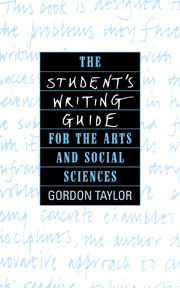2 - Reflection: asking questions and proposing answers
Published online by Cambridge University Press: 29 January 2010
Summary
I have always preferred to reflect upon a problem before reading on it.
jean piagetSpeculative thinking and writing
This is a chapter about thinking and reflection. It comes first in our consideration of essay-writing technique because it is the first of the many activities in writing an essay that you should engage in. Many, if not most, students leave the really hard thinking until after they have done the reading or research. They do this in the belief that one can't think constructively until all the information is gathered and the writing of the final draft is due to begin. This is not so, as the quotation above from the philosopher and psychologist Jean Piaget suggests.
One of the most important abilities needed to master essay-writing in the humanities and social sciences is the ability to ASK QUESTIONS of the essay topic itself as well as of the books you will read. If you can develop a facility in asking questions and in reflecting on likely answers to those questions, it is possible for a general shape for your essay (though not its precise content) to become evident to you even before you have begun on any detailed reading.
- Type
- Chapter
- Information
- Publisher: Cambridge University PressPrint publication year: 1989



